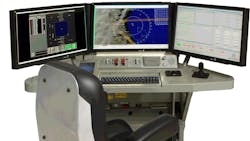Navy looks to Lockheed Martin 281 open-architecture shipboard displays for submarines and surface warships
WASHINGTON – U.S. Navy shipboard electronics experts are asking Lockheed Martin Corp. to build 281 open-architecture enterprise displays for Navy surface warships, submarines, and aircraft under terms of a $43.9 million order announced last week.
Officials of the Naval Sea Systems Command in Washington are asking the Lockheed Martin Rotary and Mission Systems segment in Manassas, Va., to provide technical insertion (TI) 16 Common Display System (CDS) variant A water- and air-cooled production consoles.
The TI-16 CDS is a set of open-architecture watch station three-eyed horizontal display consoles. This order is for the U.S. Navy and Coast Guard, as well as for the and for the governments of Japan and South Korea.
The CDS family is designed to be compatible with commercially available hardware and software; to conform to open-architecture computers and standards; and to incorporate human systems integration design principles, Navy officials say.
Related: Shipboard electronic systems pursue open architectures
This order is a modification to an $8.1 million contract the Navy awarded to Lockheed Martin in April 2016 for the Technology Insertion 16 production portion of the CDS program. It was through this original contract that Lockheed Martin effectively took over from DRS Technologies Inc., a wholly owned subsidiary of Finmeccanica S.p.A., as the lead systems integrator for the latest versions of the Navy Common Display System.
A $15.5 million contract for the Technology Insertion 12 portion of the CDS shipboard display program went to the DRS Laurel Technologies segment of DRS Technologies in Johnstown, Pa., in 2012. Lockheed Martin was a key partner to DRS on that and on previous CDS technology insertion contracts.
Other companies that historically have taken part in the Navy CDS program include General Dynamics Mission Systems in Fairfax, Va.; Barco in Duluth, Ga.; and Aydin Displays Inc., a Sparton company in Birdsboro, Pa.
Related: Navy shipboard electronics experts choose open-architecture rugged computers from GTS
Successive technology insertions represent a procurement approach designed to equip Navy vessels, aircraft, and shore installations with the latest technologies at the most reasonable costs. Technology insertions normally involve mature technologies available largely as commercial off-the-shelf (COTS) items.
Navy experts initially developed the CDS for the DDG 1000 Zumwalt-class surface-attack destroyer, as well as for Aegis modernization efforts aboard the Navy's Ticonderoga-class cruisers and Arleigh Burke-class destroyers.
Navy electronics experts have expanded the requirement for CDS to Navy aircraft carriers, amphibious assault ships, dock landing ships, aircraft, and submarines.
On this contract Lockheed Martin will do the work in Johnstown, Pa., and should be finished by September 2020. For more information contact Lockheed Martin Rotary and Mission Systems online at www.lockheedmartin.com/us/rms.html, or Naval Sea Systems Command at www.navsea.navy.mil.

John Keller | Editor-in-Chief
John Keller is the Editor-in-Chief, Military & Aerospace Electronics Magazine--provides extensive coverage and analysis of enabling electronics and optoelectronic technologies in military, space and commercial aviation applications. John has been a member of the Military & Aerospace Electronics staff since 1989 and chief editor since 1995.

